
Read our 2023 annual report

Knowledge Hub
7 reasons why gender equality is important
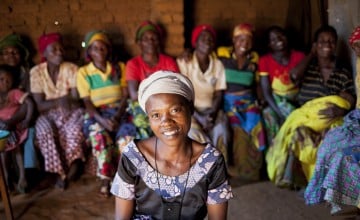
Gender equality is critical to the elimination of poverty. Here are seven reasons why.
1. Educating women and girls saves lives
Did you know that each extra year of schooling that a mother receives reduces the risk of infant mortality by 5 to 10%? In fact, if all women had a secondary education, child deaths would be cut in half, saving 3 million lives a year. Likewise, a child born to a mother who can read is 50% more likely to reach their fifth birthday. And if all mothers completed their primary education, maternal deaths would be reduced by two thirds, saving 98,000 lives.
And saving lives is really just the tip of the iceberg: A quality education for girls would also improve child nutrition, reduce child marriages and teen pregnancies, and reduce the pay gap between men and women. Not to mention offering women a pathway to financial independence.
Yet, in sub-Saharan Africa only 8% of girls finish secondary school. In Ireland that figure is 93%. Imagine what could be achieved if we could start to close that gap?
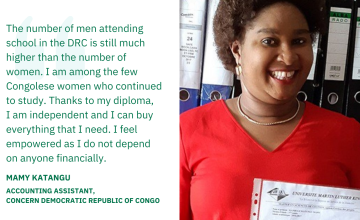
2. When more women work, economies grow
Empowering women to work has benefits not just for the individuals, but also for the wider economy. According to a McKinsey Global Institute report, if women were to play an identical role in labour markets to that of men, as much as $28 trillion, or 26%, could be added to global annual GDP by 2025.
Yet around the world, women consistently face barriers to accessing labour markets. According to UNESCO, over 2.7 billion women are legally restricted from having the same choice of jobs as men. And women’s labour force participation rate is 48.5 % compared to a rate of 75% for men. Ensuring that women not only earn the same salaries as their male counterparts but also get the same access to economic independence boosts economies. It also means that other basic needs, like healthcare, education, and adequate food and water, are more likely to be available for the whole family.
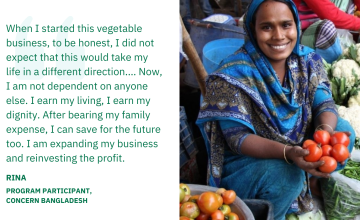
3. When women have a say in household finances, the whole family benefits
According to the Clinton Global Initiative, women reinvest 90% of their income back into their families, while men reinvest only 35%. So, as well as providing a boost for the economy, supporting women to earn an income means better health and education outcomes for their children.
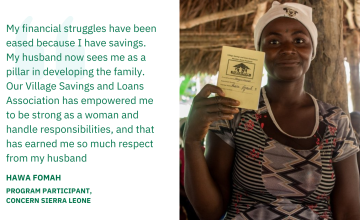
4. Gender equality in healthcare leads to better health for all
Each day, almost 1,000 women die from preventable causes related to pregnancy and childbirth. The chronic absence of healthcare, combined with the ongoing, unnecessary loss of so many women result in massive negative impacts on families and communities. Children of sick mothers are less likely to access healthcare themselves, and older siblings are usually forced to drop out of school to take care of younger siblings and contribute to the household. When women receive quality care, this not only impacts their health and that of their family’s, but also entire communities.
![They say that seeing is believing, so when my patients see the pictures [as part of the app Community Health Nurses on the Go], I think they take it seriously. It increases my confidence a lot. I’m very, very proud of what I’m doing as a community health nurse. —](https://admin.concern.net/sites/default/files/styles/360x220/public/media/images/2022-03/concern-gender-equality-ghana-valerie-mccarthy-vroom.png?changed=2022-03-17T10:52:29+00:00)
5. When governments focus on gender equality, legal protections improve
Girls who marry young are less likely to receive a complete or quality education, and child brides often suffer from higher discrimination, violence, and increased maternal mortality rates. Forced and early marriage is one of the many forms of violence against women and girls, and all forms of gender-based violence contribute to the belief that men and women can be treated differently, based on gender stereotypes that vary from culture to culture. However, when governments make an effort to address these stereotypes and inequities, it improves the legal system. In 2015, Malawi passed an historic act that established 18 as the minimum age for marriage. In a country where, at the time, 50% of girls were married by that time (and over 12% married by age 15), this was a major achievement.
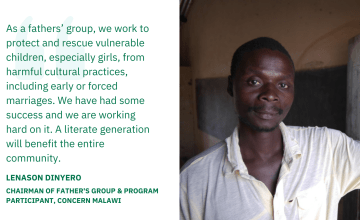
6. When women are active in peace negotiations, conflict is less likely to reoccur
Many of the countries caught in protracted conflict today are also countries that afford very few rights and protections to women. A 2015 UN Women report provides several links between gender equality and conflict, concluding that “women’s participation is key to sustainable peace.” When women are witnesses, signatories, mediators, and/or negotiators in a peace process, the agreement is 20% more likely to last at least two years. Even better, this likelihood increases over time: Peace treaties that include women in the process in a meaningful way are 35% more likely to last 15 years.
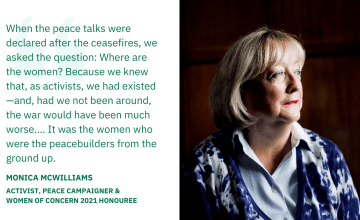
7. We can’t break the cycle of poverty without breaking the cycle of gender inequality
Gender inequality is both a major cause of and an effect of poverty and hunger. It is a vicious cycle that threatens the lives of women and children and results in millions of deaths every year. The World Food Programme estimates that 60% of chronically hungry people are women and girls. UN Women estimates that 70% of the 1.3 billion people in poverty worldwide are women. Moreover, the global estimated risk of a woman dying from a maternity-related cause is one in 4,900, but that ratio rises to one in 180 in low-income countries.
The tragic reality is that these deaths are nearly all preventable. But we need to break the vicious cycle of poverty, hunger, and gender inequality in order to prevent them.
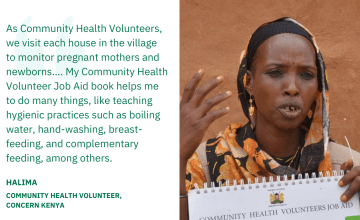

Other ways to help
Corporate support
Is your company interested in working together for a common cause?
Fundraise for Concern
From mountain trekking to marathon running, cake sales to table quizzes, there are lots of ways you can support our work.
Buy a gift
With an extensive range of alternative gifts, we have something to suit everybody.
Leave a gift in your will
Leave the world a better place with a life-changing legacy.
Volunteer with Concern
The lots of ways to get involved with our work as a volunteer
School fundraising
Without the generous support from schools, we wouldn't be able to do the work that we do.

